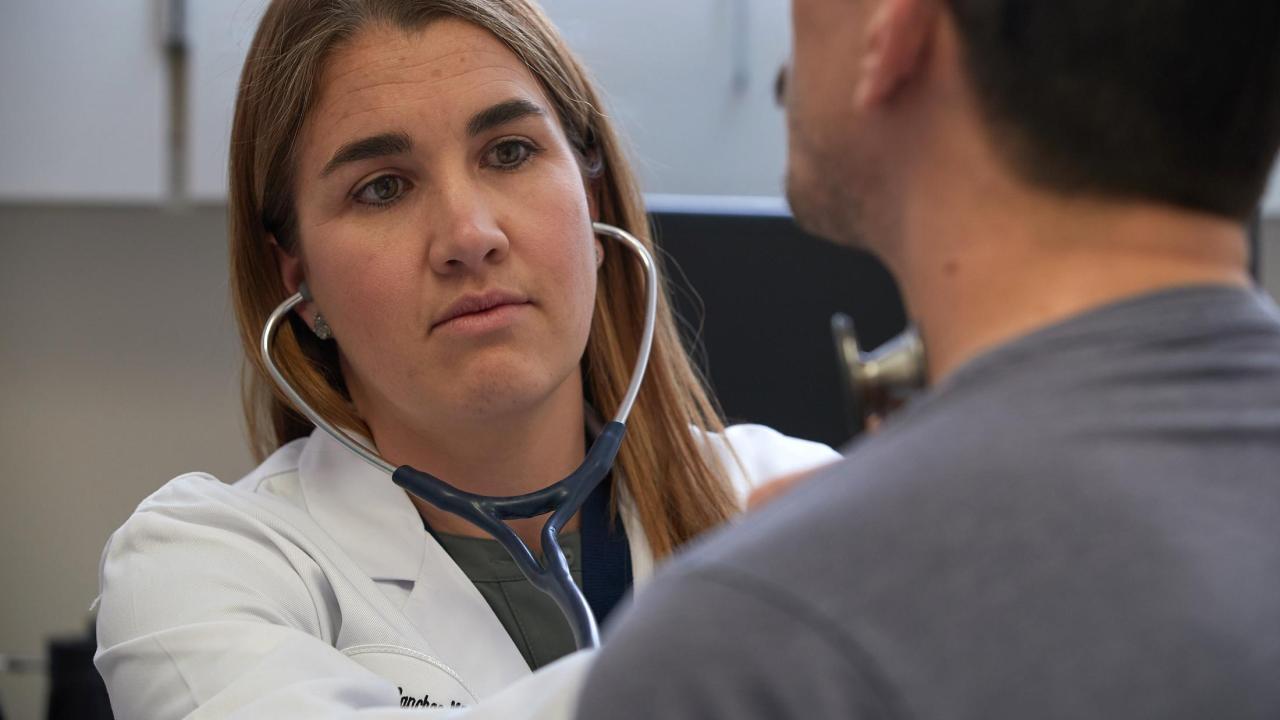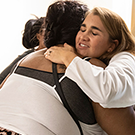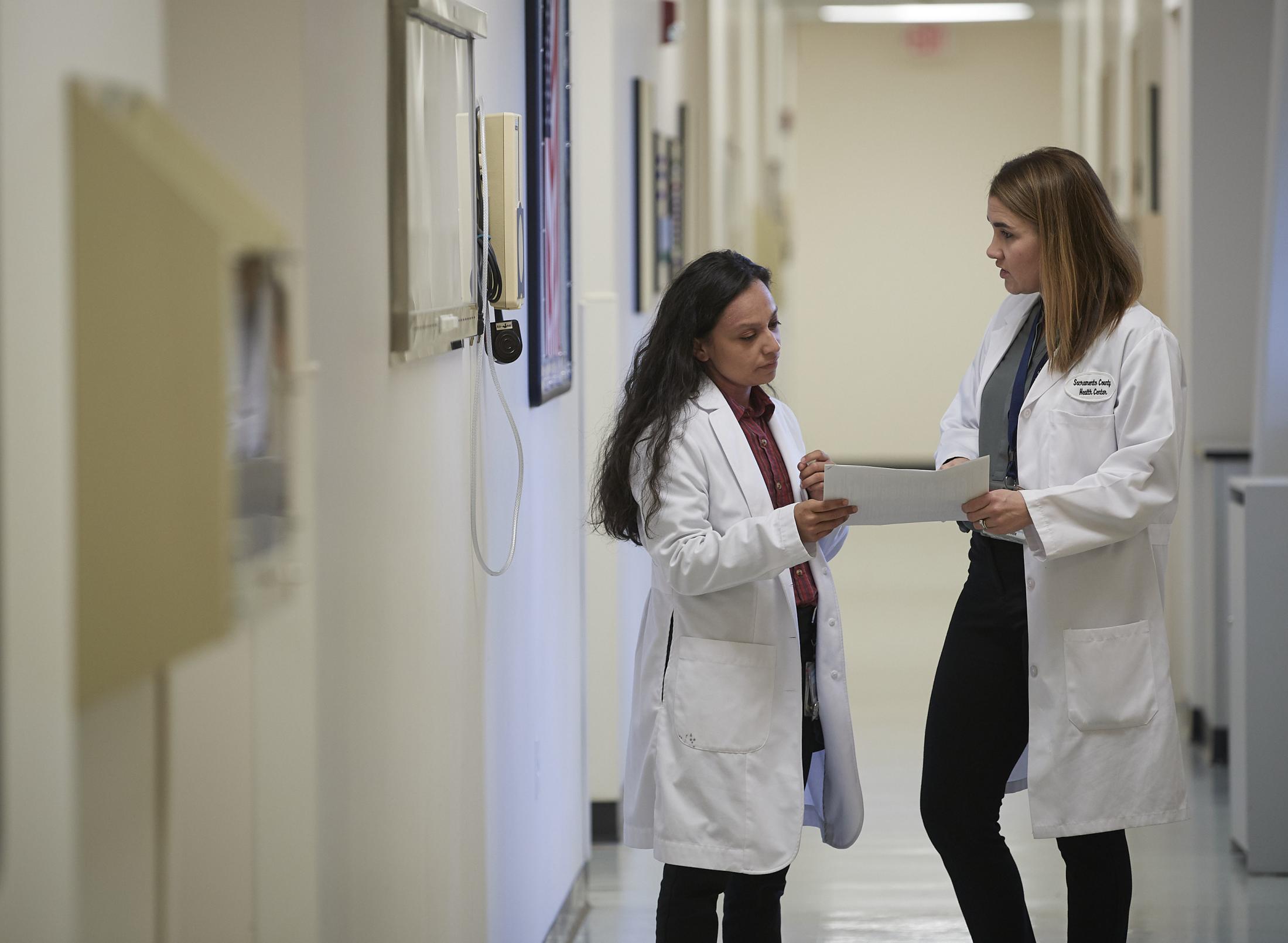
Breaking Down Barriers to Care
How an engaged approach improves health outcomes
by Sarah Colwell
Never make assumptions.
It is a philosophy UC Davis Health physician Stephany Sanchez practices daily as she treats patients from underserved communities who come to the County of Sacramento Primary Care Center.
“You have to take into account social determinants of health for all persons coming into the clinic. You can’t assume they have a stable home to go to, a place to keep their medications, or social support to follow through on their care plans,” Sanchez said. “There are so many factors that play a role in effectively engaging patients who might be vulnerable to all the barriers that limit them from being healthy.”
It is an approach to care that is rooted in humility, active listening, patience, empathy and trust.
Sanchez says this approach allows her to be an effective primary care physician and is something she emphasized with her students as director of Transforming Education and Community Health for Medical Students (TEACH-MS) — a program for UC Davis School of Medicine students interested in primary care for underserved populations in urban areas. In her current role as associate program director for the Internal Medicine Residency Program, she maintains this approach in her work with residents.
“My roles at UC Davis bridge everything that I’m passionate about in terms of underserved care,” Sanchez said, “and I’m able to engage and mentor students and residents who have similar missions and passions.”
The best way to be of service
Born in Mexico, Sanchez says she was “always a witness” to her father’s family’s lack of access to higher education and opportunity in addition to her mother’s commitment to service. Those two things, coupled with her love of science, greatly influenced her desire to seek a career in health care for underserved populations.
“I felt medicine was the best way that I could be of service because health is such an integral part of a person,” she said. “And my passion for health care is rooted, in particular, in using cultural brokerage to serve the Latinx community. I am able to put this in to practice every day in my work.”
She added, “At times, I almost feel selfish because of my great fortune in finding so much satisfaction in my work.”
In addition to being a clinician, Sanchez often serves as an advocate for her patients as they manage their health care issues. She frequently goes the extra mile to do everything from celebrate a patient’s weight loss or help navigate the complex web of insurance or billing issues.
“I think you have to be willing to do that to be an effective primary care doctor. If I don’t do it, who will? And I know I can,” she said, “Doing this type of work, caring for the underserved, speaks to why I chose medicine for a career in the first place. It’s really satisfying and gratifying to me.”
A commitment to serving the underserved
Sanchez came to UC Davis in 2008 for her general internal medicine residency after medical school. She was drawn to the school because of its commitment to training primary care physicians to help underserved communities. Specifically, Sanchez appreciated the TEACH program, a specialized third-year program, that is focused on bridging the gap and providing continuity of care for patients who are admitted to the hospital and visit the Sacramento County clinic. [Note, TEACH-MS program is for medical students and TEACH program is for residents.]
In addition to providing primary care services for about 1,000 patients a month, the Sacramento County clinic also offers pediatrics, a refugee clinic, a pharmacy, diabetes education and integrated behavior health counselors. [Note, UCDH physicians are now providing some specialty care services as well at the clinic.]
“The value of providing a patient with continuity of care can’t be overstated,” Sanchez said. “When patients can see the same physician who knows their story, rapport is built, trust evolves, and, in turn, health outcomes are improved.”
The value, however, is more important than just seeing a familiar face. Sanchez says knowing a patient’s story is all the more important when that story is atypical.
“If you meet the patients where they are and have awareness of what’s going on in their lives, then you’re going to develop a health care plan that works for them as opposed to using a ‘cookie cutter’ plan,” she said. “Ultimately that’s going to create better health outcomes.”

County clinic is known for great doctors and great care
Maricella Toledo couldn’t speak when she first met physician Stephany Sanchez. Overwhelmed by recent transitions, including the loss of a long-term job and move to a new city, her health changed. “I was hardly ever ill,” she said, “so wasn’t sure what to do. During my first appointment, all I could do was cry,” Toledo recalled. “Dr. Sanchez asked questions, listened and said, ‘I can help you.’”
Partnerships as a path
Knowing the complexities of patients’ situations, the Sacramento County clinic has developed several new partnerships with organizations in the community to provide additional resources to patients including access to mental health resources, substance abuse services and pro bono legal help.
“These partnerships are a path to more comprehensive care,” Sanchez said. “I’m able to walk down the hall and find one of the mental health coordinators who can come into the room with me and can set up a counseling session within the week, if the patient needs one. It’s something that doesn’t necessarily happen in a lot of clinics and it is really, really valuable.”
One of the TEACH-MS program community partnerships is with Harm Reduction Services, which is a local nonprofit that provides HIV and HCV testing, safe syringe exchange, STD testing, abscess treatment and free hepatitis A/B vaccinations. Through the partnership, first-year medical students work with case managers and accompany them on home visits of clients living with HIV.
“It gives a unique perspective to students of a ‘day-in-the-life’ that is not necessarily a perspective that you get in traditional medical school training,” Sanchez said.

Opening minds
Sanchez added that this engaged service model for providing care also impacts the teaching and learning for nurse practitioners, physician assistants, and medical students who do rotations at the clinic. The students are exposed to health care issues that may not be typical in other healthcare training sites.
“As the students do this work they become more keenly aware of their personal bias which allows them to approach clinical care with an open mind,” Sanchez said. “It’s hard to put into words what it adds, but it’s this experience of interfacing with an environment that, for a lot of them, is not familiar. It is a rooted experience that gives them a different perspective and makes them better health care professionals.”
It is why Sanchez says engagement is the key if health care is to be successful.
“It’s impossible to teach or provide community health without being integrated with the community,” Sanchez said. “You can’t teach community health or want students to pursue it as a career if you don’t see it in action in your training.”
About UC Davis Public Scholarship and Engagement
Public Scholarship and Engagement (PSE) is fostering a culture of engagement at UC Davis that increases the university’s impact through mutually-beneficial relationships that have local, regional, statewide, and global reach.
We envision UC Davis research, teaching and learning that serves society and makes a positive difference in the world.
